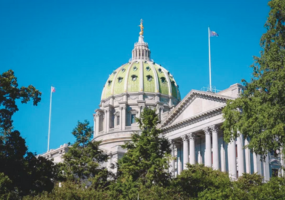 During the final round of state budget hearings last week, administration officials testified on several critical components of the governor’s proposed spending plan. Testimonies from Secretary of the Commonwealth Al Schmidt, PennDOT Secretary Mike Carroll, Education Secretary Dr. Khalid Mumin, and Budget Secretary Uri Monson highlighted proposals related to professional licensure, public transit, education spending, and more.
During the final round of state budget hearings last week, administration officials testified on several critical components of the governor’s proposed spending plan. Testimonies from Secretary of the Commonwealth Al Schmidt, PennDOT Secretary Mike Carroll, Education Secretary Dr. Khalid Mumin, and Budget Secretary Uri Monson highlighted proposals related to professional licensure, public transit, education spending, and more.
Brief recaps of the budget hearings most relevant to the business community are below:
State
Secretary of the Commonwealth Al Schmidt appeared before the Senate Appropriations Committee on Wednesday to discuss the Department of State’s request for a $5.2 million funding increase, which he said will be used to support voter registration and education activities statewide. Schmidt’s testimony also covered the implementation timeline and cost of multistate licensing compacts, improvements to the state’s professional licensure system, and application fee refunds. Schmidt highlighted improvements in processing times since the PAyback initiative was launched late last year, with no refunds issued since November 1. He also outlined plans for a pilot program in Pittsburgh to address nursing license inquiries, aiming to reduce the current 36-day wait time. Schmidt detailed reductions in wait times for various licenses, including real estate brokers, vehicle salespeople, and doctors.
Transportation
PennDOT Secretary Mike Carroll went before the House and Senate Appropriations Committees and answered questions regarding the governor’s proposal to increase mass transit funding by $282 million. Carroll highlighted inflation and declining ridership due to the COVID-19 pandemic, emphasizing the need for enhanced support to maintain or increase services and aid in ridership recovery. Carroll also discussed efforts to boost funding for road and bridge projects, including the phase-out of State Police funding from the Motor License Fund and support for enacting an electric vehicle fee. Lawmakers inquired about the distribution of funds, particularly the allocation to SEPTA, which raised concerns about rural counties’ needs. Carroll underscored SETPA’s economic importance and encouraged efforts to revise the distribution formula. He also spoke of the significance of federal funds from the Infrastructure Investment and Jobs Act, particularly for EV infrastructure, bridges, and passenger rail projects.
Education
Education Secretary Dr. Khalid Mumin and his deputies fielded questions Wednesday from House lawmakers regarding the governor’s call for $1.1 billion in new K-12 education spending. A significant portion, $872 million, would be distributed through a new fair funding formula aimed at achieving per-pupil spending parity. Republican members raised concerns about a perceived $291 million mandate for local school districts to raise property taxes, prompting debate on funding distribution metrics.
Lawmakers also questioned the absence of performance-based criteria in funding allocation, pushing for a focus on educational outcomes. Additionally, discussions revolved around the $872 million designated for a “tax equity supplement” for high-tax districts, and whether that money would be tied to a mandate that school districts lower their taxes. Secretary Mumin said this is not currently the case, but that the department is open to that discussion.
Secretary Mumin also addressed concerns about his absence from Basic Education Funding Commission hearings and expressed openness to supporting school districts interested in engaging in shared service agreements to reduce administrative costs and duplicated services, a practice long encouraged by the PA Chamber. Other topics discussed include the absence of increased education spending in the governor’s five-year outlook and the sustainability of $5.1 billion in new spending over the next seven years.
Budget
Budget Secretary Uri Monson testified before House and Senate lawmakers last Thursday to make the overall case for the governor’s $48.3 billion budget proposal, which represents a $3.2 billion increase in state spending. Monson fielded several questions from Republican lawmakers about the sustainability of the governor’s plan. These lawmakers raised concerns about a structural deficit and cited the five-year outlook that shows the Commonwealth depleting its healthy budget reserves and rainy-day fund in 2028. Monson defended the proposal, emphasizing proactive spending as cheaper than reactive measures. Senate Republican Appropriations Chair Scott Martin (R-Lancaster) said the budget proposal “uses rosy revenues and lowballed spending and puts us on the path to potential large tax increases…this budget puts Pennsylvania on the path I’m not prepared to go down.”
Others defended the governor’s proposal. “If we’re not going to make the investments now, I’m not sure when we would make the investments,” said Sen. Steve Santarsiero, (D-Bucks). In one showing of bipartisan agreement, Senators Ryan Aument (R-Lancaster) and Nick Miller (D-Lehigh) both used their time to advocate for accelerating the reduction in the corporate net income tax. Miller shared a recent conversation he had with a solar panel manufacturing company that was comparing Pennsylvania and North Carolina, where the corporate tax rate is 2.5 percent.